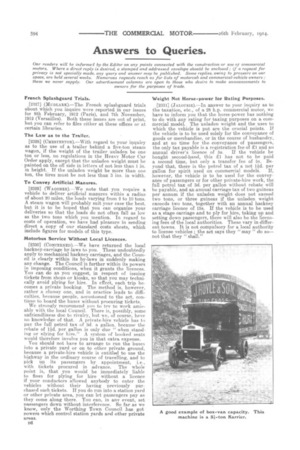Answers to Queries.
Page 22

If you've noticed an error in this article please click here to report it so we can fix it.
Our readers will be informed by the Editor on any points connected with the construction or use or commercial motors. Where a direct reply is desired, a stamped and addressed envelope should be enclosed ; if a request for privacy is not specially made, any query and answer may be published. Some replies, owing to pressure on our space, are held several weeks. Numerous requests reach us for lists of motorcab and commercial-vehicle owners ; these we never supply. Our advertisement columns are open to those who desire to make announcements to owners for the purposes of trade.
French Splashguard Trials.
[2327] (Muneanx).—The French splashguard trials about which you inquire were reported in our issues for 8th February, 1912 (Paris), and 7th November, 1912 (Versailles). Both these issues are out of print, but you can refer to files either at these offices or at certain libraries.
The Law as to the Trailer.
[2328] (Cnzsrinerox).—With regard to your inquiry as to the use of a trailer behind a five-ton steam wagon, if the weight of the trailer unladen be one ton or less, no regulations in the Heavy Motor Car Order apply, except that the unladen weight must be
• painted on the off side in letters of not less than 1 in. in height. If the unladen weight be more than one ton, the tires must be not less than 3 ins, in width.
To Convey Artificial Manures.
[2329] (MT/Loom:).—We note that you require a vehicle to deliver artificial manures within a radius of about 20 miles, the loads varying from 2 to 10 tons. A steam wagon will probably suit your case the best, but it is to be hoped that you can organize your deliveries so that the loads do not often fall as low as the two tons which you mention. In regard to costs of operation, we have had pleasure in sending direct a copy of our standard costs sheets, which include figures for models of this type.
Motorbus Service Without Local Licences.
12330] (CONCERNED).—We have returned the local hackney-carriage by-laws to you. These undoubtedly apply to mechanical hackney carriages, and the Council is clearly within its by-laws in suddenly making any change. The Council is further within its powers in imposing conditions, when it grants the licences. You can do as you suggest, in respect of issuing tickets from shops or kiosks, so that you may technically avoid plying for hire. In effect, each trip becomes a private booking. The method is, however, rather a clumsy one, and in practice leads to difficulties, because people, accustomed to the act, continue to board the buses without procuring tickets. We strongly recommend you to try to work amicably with the local Council. There is, possibly, some unfriendliness due to rivalry, but we, of course, have no knowledge of that. A private-hire vehicle has to pay the full petrol tax of 3d. a gallon, because the rebate of lid. per gallon is only due "when standing or plying for hire." A system of booked seats would therefore involve you in that extra expense.
You should not have to arrange to run the buses into a private yard or on to other private ground, because a private-hire vehicle is entitled to use the highway in the ordinary course of travelling, and to pick up its passengers by appointment, i.e., with tickets procured in advance. The whole point is, that you would be immediately liable to fines for plying for hire without a licence if your conductors allowed anybody to enter the vehicles without their having previously purchased such tickets. If you do run into a station yard or other private area, you can let passengers pay as they come along there. You can, in any event, set Passengers down without interference. So far as we know, only the Worthing Town Council has got powers which control station yards and other private areas.
De Weight Not Horse-power for Rating Purposes.
[2331] (JALoustE).—In answer to your inquiry as to the taxation, etc., of a 28 h.p. commercial. motor, we have to inform you that the horse-power has nothing to do with any rating for taxing purposes on a commercial model. The unladen weight and the uses to which the vehicle is put are the crucial points. If the vehicle is to be used solely for the conveyance of goods or merchandise, or in the course of husbandry, and at no time for the conveyance of passengers, the only tax payable is a registration fee of 21 and an
annual driver's licence of 5s. If the vehicle be bought second-hand, this £1 has not to be paid a second time, but only a transfer fee of 5s. Beyond that, there is the petrol tax of a net lid. per
gallon for spirit used on commercial models. If, however, the vehicle is to be used for the conveyance of passengers or for other private-hire work, the full petrol tax of 3d. per gallon without rebate will be payable, and an annual carriage tax of two guineas per annum if the unladen weight does not exceed two tons, or three guineas if the unladen weight exceeds two tons, together with an annual hackney carriage licence of 15s. If the vehicle is to be used as a stage carriage and to ply for hire, taking up and setting down passengers, there will also be the licensing fees of the local authorities. These vary in different towns. It is not compulsory for a local authority to license vehicles ; the act says they "may " do so— not that they "


























